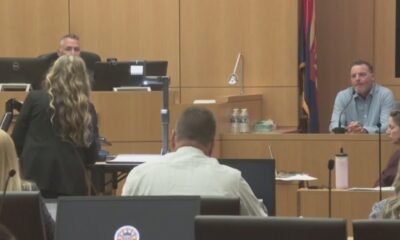2024 Election News
Pollster Reveals Missteps Behind Democrats’ Downfall

Recent analysis by pollster Mike Noble highlights the challenges faced by Democrats in Arizona during the last election cycle. He attributes their poor performance, especially among political independents, to a disconnect between party priorities and voter concerns. With independents constituting over a third of registered voters in the state, their preferences played a crucial role.
A survey indicates that 31% of independents prioritized the economy as a key issue influencing their votes, aligning closely with Republican voters. In contrast, only 18% of Democrats ranked the economy among their top three concerns, with abortion and social issues taking precedence for the party.
This discrepancy is stark: while 27% of Democrats emphasized threats to the economy, issues like abortion only resonated with 11% of independents and 6% of Republicans. Similarly, just 6% of Democrats identified immigration as a significant priority.
Noble remarked that these misalignments were evident in the voting results, impacting not only top-ticket races but also local contests. “Independents focused on what truly mattered—particularly the economy and immigration, which were central to Republican messaging,” he noted.
Despite a Republican upswing—including wins for Trump and additional seats in the state legislature—Democrat Ruben Gallego managed to secure a significant victory over Republican candidate Kari Lake for the U.S. Senate, winning by 80,000 votes. Some of Lake’s supporters have raised doubts about this outcome, questioning how Gallego could outperform Vice President Kamala Harris’s vote count in Arizona.
Noble attributes Gallego’s success to his relatability—53% of voters viewed him positively, compared to just 37% for Lake. Gallego’s efforts to establish an independent identity, especially regarding issues like the term “Latinx,” helped him resonate more with voters, distancing himself from the broader Democratic agenda.
“Ruben has distinguished himself by making decisions that set him apart from his party, which is a strategic move in a politically diverse state,” Noble explained. He emphasized that Gallego’s centrist positioning made him more attractive to a broader voter base.
As Democrats analyze the results, Noble suggests they should learn from Gallego and other centrist figures like Mark Kelly and Kirsten Sinema. He argues that adhering to more mainstream concerns and effectively communicating their relevance is key for future success in Arizona.
The survey further indicated that only 46% of voters held a favorable view of Democratic Governor Katie Hobbs, reflecting a general disaffection towards Democrats rather than her individual performance. As the upcoming presidential election year approaches, the focus will likely shift to how national Democratic strategies will impact local races.
Noble pointed out that Republicans excelled in their messaging, especially concerning immigration, a signature issue for Trump, particularly in Arizona. This focus on relevant issues contributed to their electoral gains.
Interestingly, while Democrats struggled with key issues, Proposition 139, which enshrined abortion rights in the Arizona Constitution, received overwhelming support, garnering over 61% of the vote. Noble noted that voters were capable of distinguishing between political figures and ballot initiatives.
This trend is not unique to Arizona; similar patterns emerged in states like Missouri and Montana, where voters supported abortion rights even as Trump won the popular vote. The survey, conducted from November 20 to 25 with 988 registered voters, has a margin of error of 3.1%.


















